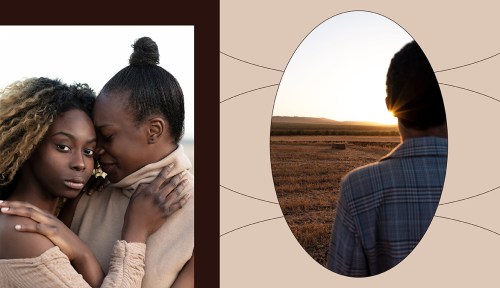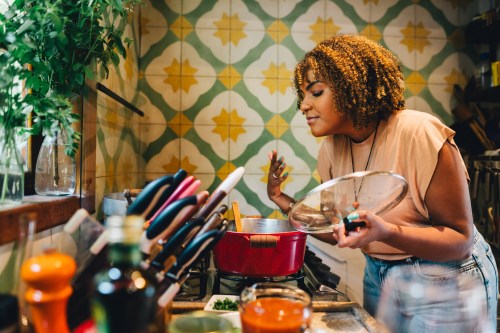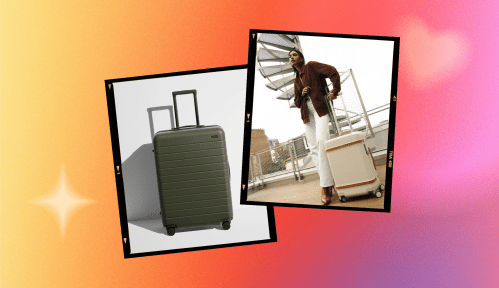Sometimes grief feels too heavy to bear. I’ve been there. And if I’m honest, I am there now. No matter how peacefully someone slips away, death is a violent interruption for the rest of us. Shifting into new identities and releasing shared dreams is disconcerting. Grief can feel like a weight that greets us each morning, sitting idly on our chests as we wake.
I have been grieving for the past five years. My life transformed after the death of one of my dearest friends. I was traveling through Colombia when I heard, and I opted not to return home for the funeral—it was something I couldn’t handle. In the aftermath, I slipped into isolation that hardened my free spirit. But, slowly, I crept back from the raw anxiety that comes with knowing that I could lose someone else.
I started writing my first book, Self-Care for Grief, armed with wisdom from what helped me cope. But loss kept coming—against the backdrop of a global pandemic that has claimed millions of lives around the world. Black death engulfed me, both from police brutality and the virus. Loved ones slipped away as new statistics were released. In a perpetual state of mourning, my life morphed into something I couldn’t recognize.
Then, weeks into writing my book, one of my favorite Aunties died. She lived in London with her family, and traveling didn’t seem safe. Rituals and rites of passage help us metabolize loss. Even now, her death doesn’t seem real.
Two months after my book release, on an October day so beautiful it would make anyone cry, my mother found my father in the garage of my childhood home. I’d moved back weeks earlier and was sleeping upstairs. Slumped in a chair, he looked serene: like he was simply too tired to move. His head was lifted toward the sky, and his eyes closed tight. His hands hung heavily at his sides as if surrendering to God. It almost seemed like he was napping in a universe far from here.
Mourning comes with a kind of yearning inherently tied to movement. From a guttural, spiritual place, you wish like hell to return to the past. One last phone call. One last hug. One last smile. One last laugh. There is never enough time. But there is travel. There is a pilgrimage to honor those who are no longer with us. There is selecting clothes, folding items, and making arrangements. There’s painstakingly packing all your things, and stepping away from your everyday life to a land of logistical considerations that help you escape from the heaviness of loss.
The same way a better life moves folks elsewhere, death brings people back home.
In the valleys of grief, I’ve traveled to Ireland, traversing rolling hills and lush green countryside, as the misty winter air enveloped every shadow. I rode dune-buggies in San Luis Obispo, hoping the adrenaline rush would soothe the feeling that I was languishing. I danced the streets of Cali, Colombia, surrounded by other Black people, finding a slither of belonging far away from home. I watched a sunset in Puerto Rico while feasting on mofongo, as reggaeton pulsated like a heartbeat. In the throes of grief, I’ve found reminders that there is still life and beauty. Travel has constantly revived me, but Black folks have always combined travel with honoring the dead.
Movement—both forced and voluntary—is a collective experience within our culture. The Great Migration is one of many historical examples. Between the 1910s and 1970s, around six million Black people moved away from the American South to escape racism and potentially find better opportunities. Gathering families, belongings, and lives painstakingly built, generations of Black folks traveled away. In essence, they were refugees of the South.
The same way a better life moves people elsewhere, death brings people back home. Starting in the 1930s, Black families in the U.S. used The Negro Motorist Green Book, an annual travel guide for Black people penned by postal worker Victor Hugo Green. The directory listed hotels, taverns, gas stations, and other safe havens for Black tourists when travel was outright dangerous. For over thirty years, Black people used The Green Book for many reasons— bereavement travel was likely one. Families could plot their route, journeying during the daylight hours. They could pack adequate food or stop selectively, so they didn’t pull over somewhere unsafe.
Even in the face of danger, we moved, migrated, and showed up. We braved unfamiliar roads to find comfort in the community, too. Maybe that’s a reason Black folks call funerals homegoings. Yes, homegoings are a spiritual business, but for those born in other places, it often involves a return to the site of one’s first breath.
In the last few years, the pandemic has complicated our bereavement rituals while exacerbating our grief. Yet, amidst pandemic lockdowns, we masked up and pounded the pavement to protect and honor Black lives. With signs and sorrow and the desire to be heard, we walked miles in service of change and collective mourning. Movement, near or far—by train, plane, car, or foot—is a ritual. For so many Black folks, we do what we can to “be there.”
Travel isn’t always possible, but when we can set out on a journey that mirrors our healing trajectory, it connects us to ancestors who migrated to new lands, expanded their identities, and planted roots on frequently unfavorable soil. Grief never ends; you simply learn to change around it. Through migration, maybe the pain can rattle through your bones, settle on your skin, and slowly begin to transform.
Oh hi! You look like someone who loves free workouts, discounts for cutting-edge wellness brands, and exclusive Well+Good content. Sign up for Well+, our online community of wellness insiders, and unlock your rewards instantly.
Sign Up for Our Daily Newsletter
Get all the latest in wellness, trends, food, fitness, beauty, and more delivered right to your inbox.
Got it, you've been added to our email list.











